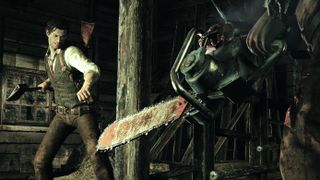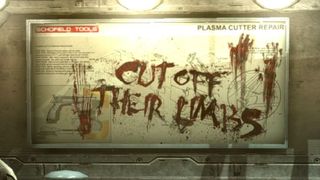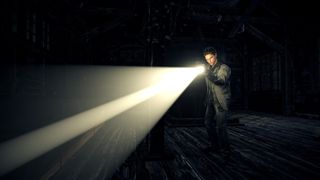Horror game clichés that need to stop
These tired old tropes have had their day. Time for some new scares.

Once you're used to something—a scary noise, spooky music, a monster—it becomes less scary. It's surprising then that the horror genre repeats itself so darn much. Some clichés are fun, like chainsaws, and show up even in the best horror games. But loads of them are just tedious, and should be avoided. Here are a few we'd love to see chucked in the bin.
Asylum settings, and the use of mental illness as a cheap horror device
When horror games choose asylums as their central settings, they almost always do so in a cheap bid to scare us. Leveraging the misconstrued stereotype that the mentally ill are to be feared, these games often include deranged or catatonic patients who the player will be forced to combat, or avoid outright. This outmoded representation of psychiatric hospitals is crude, dehumanising and unhelpful—particularly given there are so many other ways to scare players beyond a reliance on jump scares and archaic tropes. My first and fiftieth encounters with Alien: Isolation's Xenomorph were equally terrifying. The same cannot be said after Outlast's first asylum-set jump scare. —Joe Donnelly
Insurmountable IKEA shelving units in narrow hallways
Saving the world from pandemic infection comes naturally to many a survival horror game protagonist, as does crafting remarkable items from the most incongruous pairings of supplies. Fending off zombies and absurdly powerful end-of-zone bosses often falls under their purview too—yet even the most ordinary of heroes can manage by unscathed. So why is it, then, that inanimate objects such as IKEA flatpack cupboards, stacked canteen dinner trolleys, discarded filing cabinets, and/or oddly placed plastic gardening furniture pose the most impenetrable of hallway barriers? Why is it that we're forced to divert from the most direct route and wander half the map just to reach our goals? Who knows. Saving the planet is no bother, yet simple housekeeping is beyond us. —Joe Donnelly
Ghosts that perform boring plays to teach you plot stuff
No more tedious curse can befall your household than an infestation of plot ghosts. They lie in wait in dark corridors and, in Bioshock’s case, the odd toilet cubicle. When you pass they materialise and start enacting plot-critical scenes that tell you more about key characters in the world and how they walked around talking about plot stuff in times long past. They go on for ages and are always dull, and should be banished from our games forevermore. —Tom Senior
That girl from The Ring
The long oily black hair, the white dress, this ghostly staple horror classic such as The Ring has become so prevalent in games and films as to be banal. The Evil Within at least gave her big crazy limbs, but even this was not enough to stop me from thinking “oh, this again” as she crawled hungrily towards me. I’m even more bored of this archetype than zombies, which are at least fun to kill. You can paste cinematic horror archetypes into games, but you have to expect that the audience will be desensitised. These creatures can be entertaining fodder in a shooter, but they are unlikely to be scary. The Slenderman was one of the most effective game villains of recent years because it came from forums and online messageboards rather than widely popular films. —Tom Senior

Empty wheelchairs lying on their side with one wheel spinning spookily
This has long been a favourite decoration of horror game designers. It’s lazily ubiquitous to the point where I laugh whenever I see one, which probably isn’t the intended reaction. You'll turn a corner and see a wheelchair lying on its side, mysteriously empty. Oooh, who could have been in that wheelchair? Someone with difficulty walking perhaps? Spooky! And to make matters worse, one of the wheels is inexplicably spinning, as if the person who just fell out of it might still be nearby. Creepy! Or not. There's nothing scary about a wheelchair, and it's time to drop this hokey trope once and for all. —Andy Kelly
Enemies suddenly appearing when you pick something up
Horror games have been doing this forever. Sometimes it's quite effective, like when you pick up the shotgun in BioShock, the lights go out, and a dozen Splicers come after you. But mostly it's just predictable. You see a key or a weapon lying enticingly on a table, and you just know that the moment you pick it up you'll be attacked by a bunch of monsters. I'm actually more impressed when nothing happens, especially if they hit you with a scare a few moments later, just when you think you've been spared. —Andy Kelly
The biggest gaming news, reviews and hardware deals
Keep up to date with the most important stories and the best deals, as picked by the PC Gamer team.

Creepy messages scrawled on walls in blood
The first time I saw this was in System Shock 2, but it probably goes back further than that. Someone, moments before dying, uses their blood to scrawl a warning. STAY AWAY. HE COMES. NO ESCAPE. Sometimes they even leave you a tutorial message, like Dead Space's CUT OFF THEIR LIMBS, which is nice. Some games do it well, but it's largely a lazy form of environmental storytelling. Silent Hill 2 gets away with it because the messages are weird and inscrutable, but that's a rare exception. —Andy Kelly
A noise? What's that! It's a freaky pipe
The freaky pipe has become a pet peeve of mine. Deployed effectively way back in the first Alien vs. Predator, poorly-maintained plumbing is an easily-deployed jump scare in most sci-fi or industrial horror settings. You round a corner, and hear a hiss or the clattering of metal—you spin—and there! In the darkness! It's a freaky pipe. This is one of those tropes that badly needs retiring or subverting. If you must do a jump-scare fakeout, find something new: perhaps a spooky printer. Alternatively, let the player believe that it's just a freaky pipe right before the freaky pipe comes to life and bites their face off. —Chris Thursten
Flashlights with a comically short battery life
You have to suspend your disbelief in games sometimes. It's part of the deal. Geralt eating handfuls of raw meat during a fight to restore his health. That sort of thing. But I've never been able to accept horror games where your flashlight constantly runs out of power. In some games you have to switch it off until it recharges, which is nonsense. In others, particularly Alan Wake, you have to keep jamming batteries into the thing. This is not how flashlights work. Weirdly, Energizer allowed their batteries to be used in Alan Wake, which is the worst advertisement possible. They last about ten seconds. —Andy Kelly

Sewer levels
As a long-standing fan of survival horror games, there's very little that apes me more than sewer levels. Even against the genre's multitude of architecturally absurd overground maps which barely tie together—I'm looking at you, Resident Evil Zero—sewer areas always wind up feeling jarring and lazy. Now, I hardly expect pristine decor within the bowels of whichever dody establishment lies above, but the horror genre's depiction of gutter zones is more often than not a monotonous network of drab and dimly lit corridors, filled with giant spiders or reptilian beasts that almost always spout some form of poisonous discharge. They're regularly punctuated by malfunctioning red-handled valves, broken gates and, somehow, keys for the furthest-flung top floor room of the building. And of course are almost always filled with the interminably irritating freaky pipes Chris notes above. —Joe Donnelly
Audio diaries where the person making the recording dies at the end
Not to be confused with CCTV recordings of somebody getting murdered, which are fine, I'm specifically talking about audio diaries of somebody hiding in a cupboard before being audibly dragged away and murdered. I have one major problem with this: who switched the tape off? Did the monster do it? Did the victim's ghost do it? Did the dictaphone run out of storage at the perfect time? If you're going to include these in your game, have the audio diary continue to run, silently, for the realistic amount of time that the recording device could run. That's going to be between 50 and 700 hours of static, depending on the model. Nobody will thank you for doing this, but I, as a pedant, will thank you. —Chris Thursten
Most Popular


